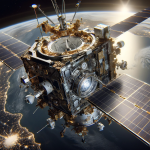Hospital Santa Maria della Pietà in Nola has made a significant leap by becoming the first in Italy to implement a robotic cardiac heart program. This move allows doctors to employ robotic ablation procedures for treating heart rhythm disorders, leveraging advanced technology to enhance patient care. This technological adoption marks a turning point for medical practices in the region, offering new possibilities for patient treatment and healthcare innovation.
Stereotaxis announced the establishment of this pioneering program, which utilizes their Genesis robotic magnetic navigation (RMN) system. The Genesis system’s smaller magnets and enhanced control mechanisms aim to improve patient experience, access, and increase lab space efficiency. The system’s robotic arms provide a broader range of motion and better X-ray angulation, further enhancing procedural precision.
Technological Advancements in Cardiac Care
Dr. Mario Volpicelli, head of the hospital’s electrophysiology unit, highlighted Genesis’s superior precision and control in cardiac ablation. This technology allows for accurate targeting of arrhythmias while minimizing patient risk. Such advancements underscore the commitment to improving patient outcomes through innovative medical technologies.
Stereotaxis has a history of advancing surgical robotics, as reflected in its recent milestones and collaborations. For instance, a hospital in Kentucky conducted its first procedures with the Genesis system late last year, demonstrating the system’s practical benefits. Moreover, an ongoing collaboration with Abbott has further pushed the boundaries of surgical robotics, underscoring the company’s role in evolving medical technologies.
Benefits of Robotic Cardiac Ablation
Implementing the Genesis system is not just about adopting new technology but also about enhancing patient care and operational efficiencies. The system’s design focuses on precision and safety, making it a valuable addition to the hospital’s toolkit. It promises to reduce procedural risks and improve recovery times, making cardiac ablation more accessible and effective.
Insights and Expectations
– The Genesis system’s smaller magnets and robotic arms enhance procedural precision.
– First-time adoption by an Italian hospital marks a significant technological milestone.
– Collaboration with industry giants like Abbott showcases the system’s potential and credibility.
The establishment of the first robotic cardiac heart program at Hospital Santa Maria della Pietà is a noteworthy development in medical technology. It signifies a crucial step towards integrating robotics in healthcare, focusing on precision, safety, and patient care. This initiative also reflects broader trends in the medical field, where collaborative efforts and technological advancements pave the way for improved treatment methodologies.










